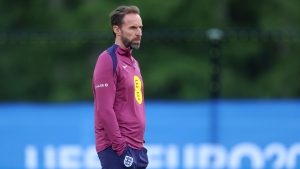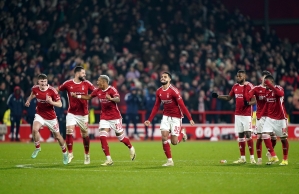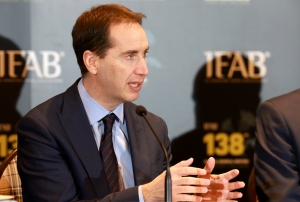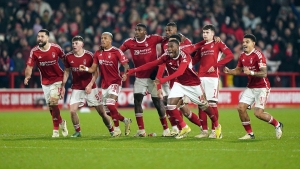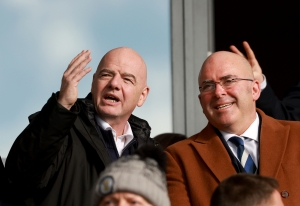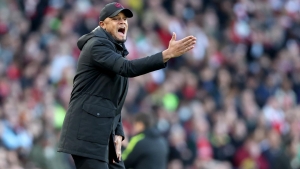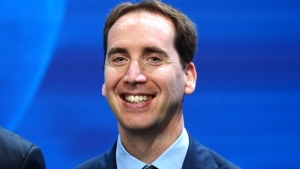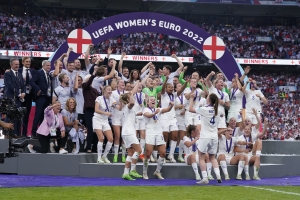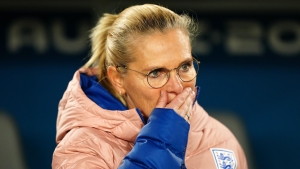Plans to honour the Lionesses with a statue outside Wembley Stadium have progressed, Football Association chief Mark Bullingham says.
Bullingham was speaking down the road from the team’s tournament base in Terrigal, New South Wales, three nights before first-time World Cup finalists England will play Spain for the title.
The Lionesses secured their first major trophy at last summer’s European Championships and could add another 13 months later with victory in Sydney on Sunday.
Bullingham said: “In terms of statues it’s something we are looking at post Euros (2022), we’ve made progress on that, and it would be right to have something to commemorate that success outside Wembley.
“We’ve made progress with the discussions but I don’t think we can announce any more than that yet.
“There are many stages you’ve got to get through – we’ve managed to get through the first stage.
“You have to go through various permissions – we’ve gone through that. The next stage is working on the design.”
Who will feature and how remains up in the air, though Bullingham added: “Our starting point was more for plans around a collective but we’ll see what design ideas come up, and you can imagine the iconic images that came out of the Euros.
“There’s some brilliant things which could be produced. Our starting point is that it’s a brilliant team.”
The time-scale for the statue’s erection is also unknown and, said Bullingham, “out of our hands” as the process also involves Brent Council, although he remains optimistic further progress is imminent.
Before the World Cup, England captain Millie Bright tweeted a statement, signed by her team-mates, outlining the players’ disappointment over the fact that an ongoing dispute with the FA over bonus payments and commercial structures had not been solved.
In the statement, the Lionesses promised to “pause discussions, with full intentions of revisiting them following the tournament,” adding, “We collectively feel a strong sense of responsibility to grow the game. And while our focus now switches fully to the tournament ahead, we believe every tackle, pass and goal will contribute to the work we are committed to doing off the pitch”.
FIFA announced its new prize money structure for this World Cup in early June, just under a month before England flew to Australia to begin pre-tournament training and preparation.
An increased prize pot of 110 million US dollars (£84.2m) came after an open letter to FIFA signed by 150 players from 25 national teams called for equal conditions and a guarantee that at least 30 per cent of prize money would be allocated to players.
For the first time, FIFA has earmarked specific amounts for each player, increasing the deeper their team goes in the tournament, though the funds will ultimately still be distributed to federations to then allocate.
Each player on Sunday’s World Cup-winning team is set to receive $270,000 (£211,785), while the runners-up will get $195,000 (£152,813) apiece.
The Lionesses want more than that, with countries including two-time champions the United States offering additional match bonuses.
Bullingham said: “We’re sorting it after the tournament. I think they have a very strong case before, a very strong case after but the reality is, there’s a discussion to be had.
“There wasn’t a lot of time before the tournament, FIFA announced the prize money very late and a completely different model that led to a different type of discussion so it just means there wasn’t a lot of time. It’s more time being an issue rather than anything else.”
The Lionesses’ Euro 2022 triumph captivated the country and drove both spectators and participants to girls’ and women’s football in record numbers, while the Women’s Super League (WSL) and Championship are on target to move out from under the FA umbrella and into an independent club-owned structure next summer.
Bullingham was optimistic about the future of the English women’s game, but pragmatically pointed out commercial investment still lags behind the eye-watering sums funnelled to the men.
He added: “I know people always think if you win a tournament you can flick a switch and you can get multi-million pound deals flying in the door. That isn’t the reality (though) we’d love it to be.”























